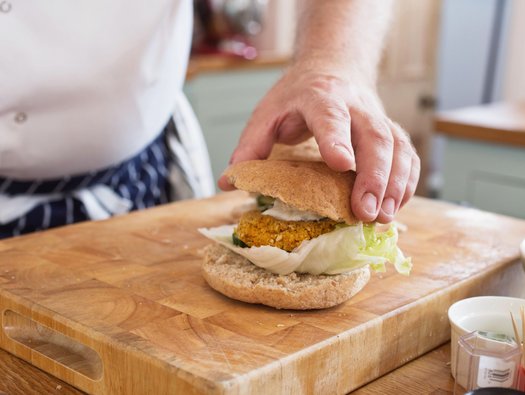Veggie bean burgers

These tasty bean burgers use carrot to add moisture which also helps to keep them low in potassium and phosphate. These are a great vegetarian choice that can easily be made vegan too.

These tasty bean burgers use carrot to add moisture which also helps to keep them low in potassium and phosphate. These are a great vegetarian choice that can easily be made vegan too.
400g tin chickpeas (in water)
300g carrots
1 garlic clove (crushed)
1 tablespoon olive oil
Squeeze lemon juice
¼ teaspoon ground cumin
¼ teaspoon ground coriander
¼ teaspoon smoked paprika
Freshly ground black pepper
7 cream crackers (approx. 60g)
4 wholemeal bread rolls
80g cucumber slices
80g lettuce leaves
4 tablespoons crème fraiche
Preheat your oven to 200°C/gas mark 6. Boil the carrots in plenty of water, when cooked drain and mash. Drain and rinse the chickpeas.
Mash the chickpeas in a bowl with a potato masher. Add the mashed carrot, crushed garlic, spices, pepper and a squeeze of lemon juice. Mix well.
With wet hands, roll the mixture into four burger-sized balls, then flatten into a burger shape. Chill in the fridge for 20-30 minutes to firm up.
Crush the cream crackers by placing them between a clean tea towel and using rolling pin. Coat the outside of the burger with cream cracker crumb by rolling them in the crushed crackers.
Drizzle a tablespoon of olive oil on a baking tray. Turn the burgers over in the oil to coat all sides and arrange on the baking tray.
Place the baking tray in the oven and cook for 20 minutes, turning the burgers over after 10 minutes. Allow to cool and rest for 2-3 minutes before serving in a wholemeal bread roll with the lettuce, cucumber and a dollop of crème fraiche.
The carbohydrate in this dish is mainly provided by the bread rolls and cream crackers. The carbohydrate value of this dish has been provided for those who have been trained in insulin adjustment.
If you have been prescribed a phosphate binder, ensure you take them with this dish. If you are on a low potassium restriction, we suggest serving with a bread roll like the recipe or alternatively with some pasta or rice. Please be aware that serving these burgers with potatoes as chips, jacket potatoes or crisps will increase the potassium content significantly.
This recipe is low in protein and ideal if you have been advised to lower your protein intake. If you have been advised to increase your protein intake you could have a bigger portion, or use more chickpeas than carrots.
Use gluten-free breadcrumbs instead of the crackers and serve with a gluten-free roll.
Use a non-dairy crème fraiche.
There is no added salt in this recipe but some of the ingredients contain a small amount of salt, which makes it slightly above the range to be classified a low salt dish. Salt content in bread and rolls can vary. When choosing a bread roll, check the nutritional information and choose the ones with the lowest salt content. We have used crème fraiche rather than ketchup to help reduce the salt content. Often burger sauces and relishes contain large amounts of salt. Check the food labels when you are buying these items, and if they are high in salt consider using less.
Any leftover burgers should be allowed to cool, refrigerated and consumed within two days. You can also freeze the burgers uncooked and then bake them from frozen. This will take about 45 minutes for baking at 200°C/gas mark 6.
If you have one you can use a food processor instead of potato masher. Use the pulse setting to retain some texture. You can change the spices to suit your taste and can add some chilli if you like them spicy. You can also use this recipe to make 12 falafel sized balls instead of 4 burgers.
By giving us your email address, you're giving us permission to send you the latest news from Kidney Care UK. Further information about how we protect and use your personal data is available in our Privacy policy. If you would like to change the way we communicate with you at any time please email [email protected]. You can unsubscribe at any time by using the link at the bottom of every email we send.